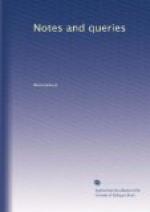Sometimes she is supposed to come like the Irish banshee, in a dark mist, to the windows of those who have been long ill; when flapping her wings against the pane, she repeats their names with the same prolonged emphasis; and then it is thought that they must die.
It is this hag who forms the torrent beds which seam the mountain side; for she gathers great stones in her cloak to make her ballast, when she flies upon the storm; and when about to retire to her mountain cave, she lets them drop progressively as she moves onwards, when they fall with such an unearthly weight that they lay open the rocky sides of the mountain.
In some parts of South Wales this hag of the mists either loses her sway, or divides it with a more dignified personage, who, in the form of an old man, and under the name of Brenhin Llwyd, the grey king, sits ever silent in the mist.
Any one who has witnessed the gathering and downward rolling of a genuine mountain fog must fully appreciate the spirit in which men first peopled the cloud with such supernatural beings a those above described; or with those which dimly, yet constantly, pervade the much-admired Legend of Montrose.
Seleucus.
* * * * *
WILLIAM BASSE AND HIS POEMS.
I regret that I am unable to offer any information in answer to “Mr. P. Collier’s” inquiry (No. 13. p. 200.) respecting the existence of a perfect or imperfect copy of a poem by William Basse on the Death of Prince Henry, printed at Oxford by Joseph Barnes, 1613, and am only aware of such a poem from the slight mention of it by Sir Harris Nicolas in his beautiful edition of Walton’s Complete Angler, p. 422. But as the possessor of the 4to. MS. volume of poems by Basse, called Polyhymnia, formerly belonging to Mr. Heber, I feel greatly interested in endeavouring to obtain some further biographical particulars of Basse,—of whom, although personally known to Isaac Walton, the author of one or two printed volumes of poems, and of the excellent old songs of “the Hunter in his Career” and “Tom of Bedlam,” and worthy of having his verses on Shakspeare inserted among his collected poems, yet the notices we at present possess are exceedingly slight. We learn from Anth. Wood, in his Ath. Oxon., vol. iv. p. 222., that Basse was a native of Moreton, near Thame in Oxfordshire, and was for some time a retainer of Sir Richard Wenman, Knt., afterwards Viscount Wenman, in the peerage of Ireland. He seems also to have been attached to the noble family of Norreys of Ricot in Oxfordshire, which is not far from Thame; and addressed some verses to Francis Lord Norreys, Earl of Berkshire, from which I quote one or two stanzas, and in the last of which there is an allusion to the [plainness of the] author’s personal appearance:




